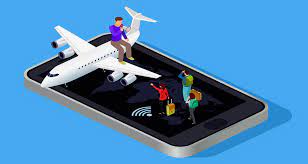- Have any questions?
- Office: +1 (650) 345-8510
- Mobile: +1 (650) 576-6916
- norm@traveltechnology.com
The Impact of the Lufthansa GDS Fee, Will Metasearch be Coming to Airline.com sites?
Bloomberg West Interview
August 19, 2014After 20 Years I am Still Looking for Innovation in the Travel Industry
December 19, 2015Lately, I have found it difficult to find time to blog as Travel Tech Consulting juggles multiple projects across the travel industry, but I felt compelled to comment on last week’s news that Lufthansa would be charging 16 Euros for bookings through the GDS. I have read lots of commentary on this action ranging from support from fellow carriers and hoteliers commending Lufthansa as taking a bold move to shift costs to claims from the corporate travel community that this action will destroy competitive shopping. Over the last 3-4 years, Travel Tech Consulting has conducted numerous research projects interviewing airlines and corporate travel stakeholders so the Lufthansa announcement was not a complete surprise.
All the airlines have some common goals that point to this type of move:
- A desire to eliminate the “financial assistance” received by the TMCs and OTAs which is essentially a kick-back of segment fee funds paid by the airlines. The financial assistance dates back to a begone era when the airlines owned 100% of the GDS and could leverage bias in order to move market share. The financial assistance sweetened the offer from the airline/GDS and was used successfully convert TMCs and travel agencies. Airlines no longer use the GDS as a way to move market share and in fact have been bemoaning the GDS fees as being too high for the last 10-15 years ever since they sold off their ownership of the GDS. Despite this market shift, the financial assistance passed on by the GDS remains an important source of income for TMCs and OTAs. I have been warning TMCs for many years not to expect financial assistance to continue indefinitely. The second and third tier TMCs and OTAs are most vulnerable as the volume of the major mega-TMCs and two large global OTAs will likely force the GDS to continue to pay financial assistance even if the underlying economics change.
- As I explained in my Phocuswright study last year , by using IATA’s New Distribution Capability (NDC), the airlines want to take control the offer. This means that airlines want every fare request to come to their systems. The major carriers have invested significantly in merchandising platforms designed to dynamically bundle ancillary services based on a customer’s value.
- Many airlines have been implementing corporate recognition capabilities on their airline.com site. It wasn’t until this project was complete did Lufthansa feel comfortable to make this dramatic move.
- An overarching theme the airlines want to implement is Customer Experience Management (CEM). This means collecting customer information at every touch point and delivering personalized services at every touchpoint. Delivering this CEM vision within the corporate travel market has been very challenging as often the channel (TMC/GDS) passes through limited information on the customer and prevents the level of customer intimacy desired by the airlines.
I agree as many have argued, that the biggest obstacle to implementing a direct channel bias is the elimination of transparency to compare fares. The assumption is that the airlines will simply ignore this issue to gain the direct channel cost advantage, but that is likely underestimating the airlines understanding of the market. What if an airline implemented a competitive shopping engine on their airline.com site? The technology is already available by simply becoming an affiliate of a meta-search company such as Kayak or Hipmunk. In addition, with metasearch capabilities, the airline could see the offer from the competitor and use their merchandising software to sweeten a dynamic, personalized offer to the business traveler.
The other major obstacle is support. Progressive TMCs are using Concur’s TripLink API to bring an out of channel support application to the agent desktop. In fact, TMCs have an excellent opportunity to charge higher fees for support of direct bookings (a necessary revenue source to pursue if financial assistance disappears).
Of course the staggering of airline contracts has been an important GDS strategy to avoid a big bang shift from the airlines. Despite this fact, expect other airlines to implement direct channel shift strategies in the coming weeks and months. Not all will be as blatant as Lufthansa’s fee, but the desire and intention is clear. Also keep in mind, mobile apps, create a 1:1 opportunity for the airline for direct distribution beyond any fee or industry effort. With many corporations still struggling to manage travel apps, airlines (and hoteliers too!) may successfully implement share shift to the direct channel by simply using the app to present unique offers to their best corporate travelers. One thing is for sure, even if the Lufthansa move does not stand, we are on the cusp of some radical changes in corporate travel distribution.


